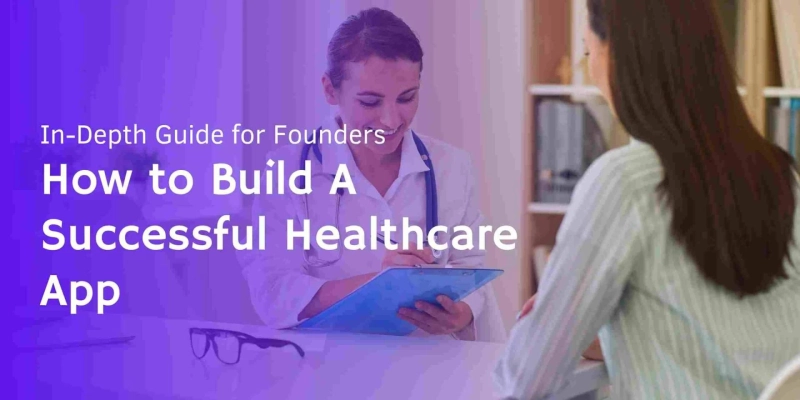With the rise of technology, healthcare is evolving rapidly, and mobile apps are leading the way. These apps have become essential for patients and healthcare providers, providing convenience, accessibility, and better patient outcomes. If you\'re considering developing a healthcare app, this guide offers valuable insights to help you create a successful one.
What is Healthcare App Development?
Developing healthcare apps involves creating software applications tailored to meet specific healthcare-related requirements. These apps are designed for patients, healthcare providers, and administrative staff in the healthcare industry. The main objective of healthcare app development is to enhance the standard of care, simplify procedures, and enhance the overall healthcare experience.
What is the Difference Between a Health App and a Medical App?
To effectively develop a healthcare app, it\'s essential to differentiate between health and medical apps. Health apps encourage overall wellness, physical fitness, and lifestyle habits, while medical apps support healthcare providers in diagnosing, tracking, and treating medical conditions. The regulations and level of accuracy necessary for these two types of apps can differ significantly.
What Types of Healthcare Apps Are There?
Different types of healthcare apps serve other purposes. Some examples are:
Telemedicine Apps: These apps allow patients to have virtual consultations with healthcare providers, which can help increase access to healthcare services.
Health and Wellness Apps: These apps help users manage their overall health by tracking fitness, planning nutrition, and managing stress.
Medical Records Apps: These apps allow patients to access and manage their medical records securely.
Medication Management Apps: These apps can assist users in following their medication schedules and dosage instructions.
Diagnostic Apps: Some apps use AI algorithms to help with the initial diagnosis of certain conditions.
Use Cases for a Healthcare App
Healthcare applications have numerous benefits, including:
Remote Monitoring: Patients can monitor their vital signs and share them with healthcare providers.
Appointment Scheduling: Users can easily schedule appointments with doctors and specialists.
Medication Reminders: Apps can send reminders to patients to ensure they take their medications.
Health Education: These apps provide users with information on various health topics.
Emergency Assistance: Some apps offer emergency services in critical situations and connect users with medical professionals.
Examples of Successful Healthcare Apps
To better comprehend the development of healthcare apps, let\'s examine some successful examples:
- MyFitnessPal: This health and wellness app assists users in monitoring their diet and exercise routines.
- ZocDoc: An appointment scheduling app that connects patients with nearby healthcare providers.
- Ada: An AI-powered diagnostic app that aids users in evaluating their symptoms and comprehending potential health conditions.
- Epic Systems: A medical records app widely utilized by healthcare institutions to securely manage patient data.
How Much Does It Cost to Develop a Healthcare App?
The expenses involved in creating a healthcare app can differ depending on various factors like features, complexity, platform, and regulatory compliance. In general, a simple healthcare app can cost from $50,000 to $100,000, while intricate projects may need investments of hundreds of thousands of dollars or even more.
How to Develop a Healthcare App?
When developing a healthcare app, it\'s essential to follow these key steps:
- Conduct market research to understand your target audience, competition, and market trends.
- Clearly define the goals and functionalities of your app.
- Create user-friendly and visually appealing interfaces.
- Build the app with a focus on security and data privacy.
- Thoroughly test the app for functionality, usability, and security.
- Ensure your app meets healthcare industry regulations.
- Release the app on app stores and promote it to your target audience.
- Improve the app based on user feedback and emerging technologies.
Following these steps will help you develop a successful healthcare app.
Choosing a Healthcare Mobile App Development Company: Tips & Things to Pay Attention
Choosing the right healthcare mobile app development company is crucial for the success of your project. To help you make the right decision, consider the following tips:
Check their experience: When researching companies to develop your healthcare app, it\'s essential to check their understanding. Look for companies with a proven track record in developing similar apps to ensure they have the expertise and knowledge necessary to create a successful product. This can increase the likelihood of a positive outcome for your project.
Check their compliance expertise: The company must clearly understand healthcare regulations and how to navigate them. This will help ensure compliance and avoid any potential legal issues. One way to achieve this is by conducting regular training sessions for employees and keeping up-to-date with any regulation changes. It\'s also a good idea to have a designated compliance officer who can oversee the company\'s adherence to healthcare regulations. By prioritizing compliance, the company can maintain a positive reputation and provide safe and effective healthcare services.
Verify their security measures: When selecting a company to work with or entrust with sensitive information, it is essential to ensure that they prioritize data security and HIPAA compliance. This can help protect you and any individuals whose data may be involved. Research potential partners and ask about their data security practices and compliance measures.
Request client references: When hiring a service provider, requesting references from previous clients is essential. This can help you assess their satisfaction with the service they received and give you an idea of what to expect. Feel free to contact these references and ask specific questions about their experience. This will help you make an informed decision and avoid any potential issues.
Understand their development process: Please provide more information about what you would like to learn about the company\'s development methodology and communication process. Are there any particular areas of interest or questions you have?
Get cost transparency: Can you please provide me with a detailed breakdown of the costs associated with this project and the expected payment schedule? I want to clearly understand the financial obligations before moving forward. Thank you.
In conclusion, building a successful healthcare app requires careful planning, a deep understanding of user needs, compliance with healthcare regulations, and the right development partner. By following the steps outlined in this guide and paying attention to the key considerations, you can embark on a journey to create a healthcare app that makes a meaningful impact in the healthcare industry.



